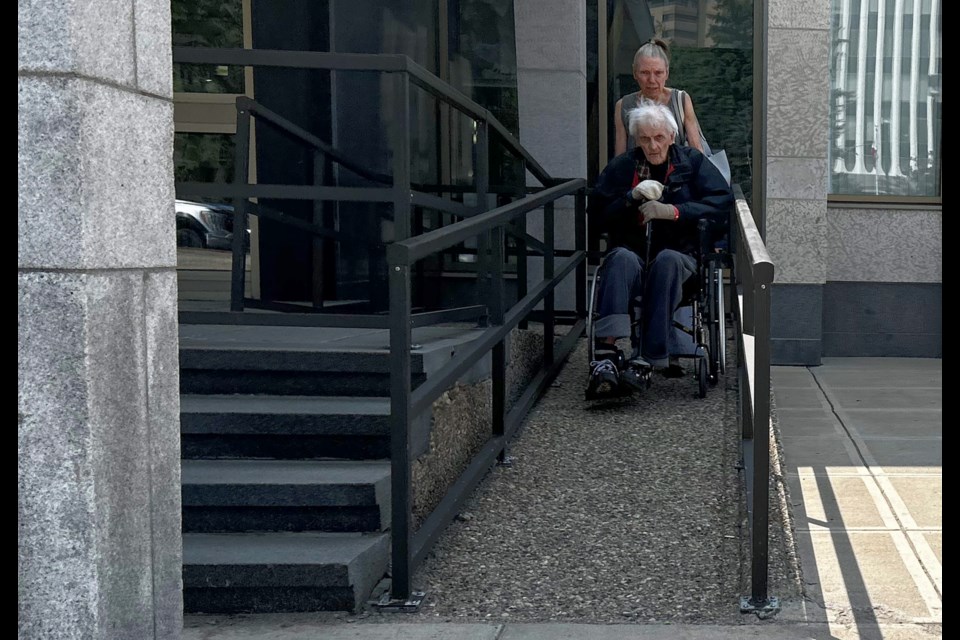REGINA – Lawyers presented their closing arguments today in Regina Court of King’s Bench regarding the murder case involving Joseph Thauberger.
The 80-year-old man stands accused of first-degree murder and indignity to a body relating to the 1997 death of his brother, Patrick Thauberger.
Joseph’s lawyer Tyne Hagey began her submission by acknowledging his guilt on the charge of indignity to a body, but stressed the importance of the ability to prove the murder charge.
“Beyond a reasonable doubt is not imaginary,” Hagey said, noting if her client is found guilty, it must be without a reasonable doubt. “It can’t be based on sympathy and prejudice. It needs to be based on reason and common sense.”
According to testimony during the trial, Joseph claimed to have hired a man to bury Patrick’s body in a slough. Hagey noted that whether or not this claim is believed by the Court, Joseph is still accountable for the charge - regardless if a third party was involved or not.
Eschewing an argument for manslaughter, Hagey focused on possible reasoning for either first or second-degree convictions.
By definition, first-degree murder requires a pre-conceived plan carried out prior to the act.
“Mere opportunity to plan a murder is not in itself proof that the accused planned the subsequent murder.”
Hagey is confident that such a plan did not exist in Joseph’s case, and explored the possibility of second-degree murder.
“There is not enough evidence that can be relied on to prove beyond a reasonable doubt that Joe killed Pat, or that there was a planned, deliberate killing of Pat,” she summed.
Addressing the post-offence conduct - that of Joseph removing Patrick’s body from the Francis Street house and taking him to a rural location east of Regina - Hagey argued that it was “so poorly done,” and “not planned or thought out.”
“Certainly, that’s not what many of us in this room would do, but that’s what he did,” she said of the actions, reiterating Joseph’s fear of wrongful conviction weighing heavy on the man’s mind.
Hagey also examined the reliability and credibility of witness testimony, raising concerns over Barbara Hayes’ testimony.
“Barbara is a very compelling person. She gave off the impression that she was doing her best to tell the truth,” she said of Joseph’s former wife, pointing out that her evidence was not reliable when it comes to establishing a burden of proof. Memory gaps on the day of Patrick’s death and the issue of Hayes not coming forward with information until 2020 were two areas Hagey noted in particular.
“These are issues that are too large to overcome,” she said. “The Court certainly can take into account some of what Barbara is saying, but the reliability issues are outstanding.”
The Crown began their submission by stating their conclusion from trial evidence.
“Patrick Thauberger was deliberately killed in a premeditated act of violence by the accused, who was motivated to preserve what he believed was rightfully his - farmland put into Patrick's name,” said Crown prosecutor Andrew Campbell. “For 23 years, Joseph lied to his friends, family, and to the police about what happened to Patrick.”
The Crown focused heavily on the confession by Joseph to an undercover officer regarding the murder of Patrick.
“The accused told [name redacted] the truth because he asked for the truth,” Campbell said, disputing the claim that Joseph was motivated by money to give a murder story. In testimony, Joseph noted how he “had to confess to a serious crime” in order to secure the promised payment of $32,000. However, Campbell noted explaining how Joseph took Patrick to the slough would seem adequate if it were true.
Campbell also poked holes in Joseph’s testimony, relaying examples where the man’s story changed during direct and cross-examination.
“The accused testimony regarding the death was that his brother fell down the stairs and continued to breath for up to five minutes as the accused stood four feet above his brother’s body, pondering his next move and worrying about himself in that moment,” Campbell told the court. “At that time, the accused - who had a telephone and Barbara available - could have called for help, but he didn’t.”
The Crown also questioned the existence of the “mystery man” who assisted in the burial of Patrick’s body.
“Rather than conceal what was likely the most important secret of the accused’s life, the accused hired a mystery man - a man the accused couldn’t even remember or make up - to do the deed,” Campbell said.
He ended the Crown argument by playing approximately five minutes of video confession by Joseph to the undercover officer.
A decision in the matter is expected to be heard on July 27.
— for more from Crime, Cops and Court.





